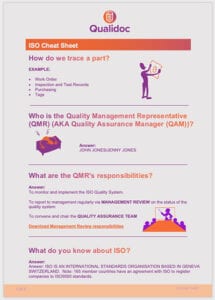With all the emphasis on measurement in the ISO9001 standard it is sometimes easy to overlook the importance of the day-to-day production that is just as important. For example, what does “delivery” mean in your business? It could mean delivery to a specific site, or conclusion of system installation, or when the product leaves your warehouse or site, or when a ship arrives to discharge cargo at a port thousands of miles from your site. It pays to consider carefully where the company’s responsibility ceases. It is too late when the signatures are dry on the contract.
Questions that come to mind: which carriers do you use? Are they available at all hours of the day and night, should you need that kind of service? Are you responsible for delivery to a site other than that of your customer? Who has authority in your company for releasing the product or service to the customer? Which of your customers’ representatives has the authority to accept delivery of a product or service from you?
What does “preservation” imply? It means protecting items; for example, by shrink wrapping or other special packaging, surface treatments. Adequate storage will be needed such as racks, shelves, cupboards, packaging materials for production equipment and tooling.
Extra storage space might be easy to estimate, but what about other conditions such as temperature and humidity, critical parts, including parts for which the customer might have set the storage and preservation criteria? You might need something as simple as a protective blind to protect items from excessive sun. This problem came up in one of my contracts where fabric was glued and the hot sun through a window altered the consistency of the glue as it was being used.
Housekeeping is very important. The assessor will be looking at the general cleanliness and care which is evident (or not) at your facility. Avoidable dirt and clutter could be regarded as lack of commitment to the standard. The assessors will be looking for anything lying loose which should be under control. This includes parts lying about in the yard or documents scattered on someone’s desk or (worse) have been lying for fifty years in a dark corner or hiding in binders which have faded into the background. They are uncontrolled as well as being untidy.
The yard is part of your facility so take the time to clean it up, especially if it is apart from the main site but will be included in the certification audit. The assessor will expect to find that all quality-critical items are secured, maintained and protected from damage, corrosion, and other conditions (such as dirt or damp) that could cause the product to deteriorate.
Your storage areas will be audited, so if you have items waiting for the customer to decide what needs to be done, include these items and their condition in the internal audits. Make sure they are segregated and identified.
One of my valuable military aerospace contacts audited a supplier recently and found the housekeeping conditions unacceptable to the point where he shut down the audit; so be warned.
